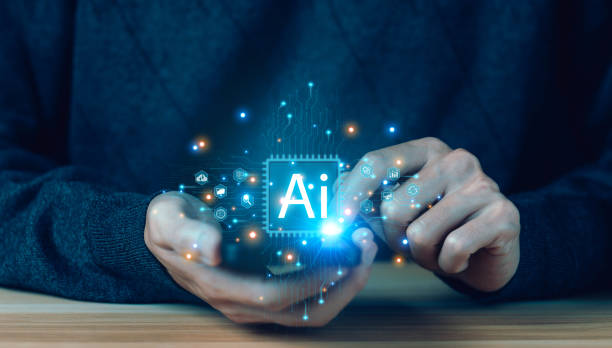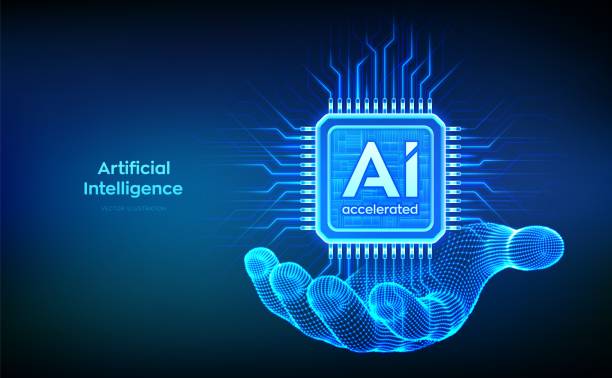What is Artificial Intelligence and what are its applications?

Artificial Intelligence (#AI), as a branch of computer science, seeks to build machines capable of performing tasks that typically require human intelligence.
These tasks include learning, reasoning, problem-solving, perception, and natural language understanding.
AI is not just a technology; rather, it is a collection of methods and algorithms that enable machines to learn from data and make decisions.
The applications of Artificial Intelligence are vast and affect almost all aspects of our lives.
Among its most important applications are the following:
- Healthcare Diagnosing diseases, developing new drugs, and providing personalized care.
- Finance Fraud detection, risk management, and automated financial services.
- Automotive Self-driving cars and advanced driver-assistance systems.
- Manufacturing Process automation, quality control, and supply chain optimization.
- Education Providing personalized education and smart learning systems.
Indeed, AI seeks to create systems that can think and make decisions independently, and this can bring about enormous transformations in various industries.
Is your e-commerce website ready to attract maximum customers and increase sales? Rasaweb transforms your online business with modern and efficient e-commerce website designs.
✅ Increased speed and improved SEO
✅ Excellent user experience on mobile and desktop⚡ Get a free e-commerce website design consultation from Rasaweb!
Types of Artificial Intelligence: A Deeper Look

Artificial Intelligence can be divided into different types based on its capabilities and performance.
One of the most common classifications divides it into Narrow AI (Weak AI) and General AI (Strong AI).
Narrow AI is designed to perform a specific task and performs very well in that limited domain.
Examples of Narrow AI include facial recognition systems, voice assistants like Siri and Alexa, and movie recommendation systems on Netflix.
These systems are capable of performing their tasks with high accuracy but cannot perform other tasks or learn in new domains.
Strong AI, in contrast, aims to create machines that can perform any task a human can.
This type of AI is still in the research and development stages, and no complete example of it exists.
Strong AI requires the ability to understand, learn, reason, and solve problems in various domains.
Some researchers believe that Strong AI could become a reality in the near future, while others are skeptical.
Furthermore, AI can also be categorized based on learning methods.
Machine learning, deep learning, and reinforcement learning are among the most important learning methods in AI.
Each of these methods has its own advantages and disadvantages and is used to solve different problems.
Machine Learning: The Beating Heart of Artificial Intelligence

Machine Learning is one of the most important subfields of Artificial Intelligence that enables machines to learn from data without being explicitly programmed.
In essence, machine learning allows machines to identify patterns and relationships within data and make predictions and decisions based on them.
Machine learning algorithms can automatically improve their performance by receiving new data.
There are various types of machine learning algorithms, each suitable for solving specific problems.
Supervised Learning is one of the most common types of machine learning, where the machine is trained using labeled data.
Unsupervised Learning, in contrast, uses unlabeled data to identify hidden patterns and structures.
Reinforcement Learning is another type of machine learning in which the machine improves its behavior by receiving rewards and penalties.
The table below lists some common machine learning algorithms and their applications:
| Algorithm | Application |
|---|---|
| Linear Regression | Housing Price Prediction |
| Decision Tree | Disease Diagnosis |
| Support Vector Machine | Image Recognition |
| K-means Clustering | Customer Segmentation |
Deep Learning: A Revolution in Artificial Intelligence

Deep Learning is a subset of machine learning that uses deep neural networks to analyze data.
Deep neural networks consist of multiple layers of nodes, also known as neurons.
Each layer in these networks extracts specific features from the data and passes them to the next layer.
This process enables deep neural networks to identify complex and abstract patterns in data.
Deep learning has led to significant advancements in various fields in recent years.
Image recognition, natural language processing, machine translation, and speech recognition are among the most important applications of deep learning.
Facial recognition systems, self-driving cars, and advanced voice assistants all leverage deep learning.
One of the most significant advantages of deep learning is its ability to automatically extract important features from data.
In traditional machine learning methods, engineers had to manually select appropriate features, but in deep learning, this is done automatically by neural networks.
This makes deep learning highly suitable for solving complex and large-scale problems.
Tired of losing customers due to poor e-commerce website design? With Rasaweb, solve this problem forever!
✅ Increase sales and conversion rate of visitors to customers
✅ Smooth and attractive user experience for your customers⚡ Get a free consultation
Natural Language Processing: A Bridge Between Humans and Machines

Natural Language Processing (NLP) is a branch of artificial intelligence that enables machines to understand and interact with human language.
The main goal of NLP is to create systems that can analyze text and speech, extract their meaning, and provide appropriate responses.
NLP has applications in various fields, including machine translation, sentiment analysis, text summarization, question answering, and text generation.
One of the most important applications of NLP is in the development of voice assistants like Siri and Alexa.
These assistants use NLP to understand users’ voice commands and provide appropriate responses.
NLP is also used in chatbot systems that can automatically interact with customers and answer their questions.
NLP algorithms use various techniques for language analysis, including syntactic analysis, semantic analysis, and pragmatic analysis.
Syntactic analysis examines sentence structure, semantic analysis examines the meaning of words and sentences, and pragmatic analysis examines how language is used in different contexts.
Recent advancements in deep learning have significantly improved the performance of NLP algorithms.
The Future of Artificial Intelligence: Opportunities and Challenges

Artificial Intelligence (#AI) is rapidly advancing and is expected to bring about immense transformations in our lives in the near future.
There are countless opportunities in various fields, including healthcare, education, manufacturing, transportation, and financial services.
AI can help improve the quality of life, increase productivity, and solve complex problems.
However, the advancement of AI also brings challenges.
One of the most significant challenges is the issue of unemployment.
With process automation, many jobs may be lost, which could lead to increased unemployment and social inequality.
Another challenge is ethics.
AI systems must be designed to act fairly and impartially and to respect individuals’ rights.
Furthermore, security is also of paramount importance.
AI systems must be protected against cyberattacks and misuse.
To address these challenges, it is necessary for policymakers, researchers, and industrialists to collaborate in creating appropriate legal and ethical frameworks for the development and use of artificial intelligence.
Additionally, special attention must be paid to educating and training skilled human resources in the field of AI so that we can make the best use of the opportunities this technology offers.
Artificial Intelligence in Iran: Current Status and Outlook

Artificial Intelligence in Iran has also gained attention as an important and strategic technology.
The government and universities have made significant efforts to develop and promote AI in the country.
Numerous research centers in Iran’s top universities are active in the field of AI, and various projects are underway in this area.
Iran has high potential in the field of AI and could become one of the leading countries in this field in the near future.
However, there are also challenges in the path of AI development in Iran.
Budget shortages, a lack of specialized human resources, and limited access to data are among the most significant of these challenges.
To overcome these challenges, it is necessary for the government and the private sector to collaborate, make the necessary investments in AI, and create an environment for training specialized human resources.
The table below lists some of the most important research centers and universities active in the field of AI in Iran:
| Research Center/University | Area of Activity |
|---|---|
| Sharif University of Technology | Machine Learning, Natural Language Processing |
| University of Tehran | Computer Vision, Robotics |
| Amirkabir University of Technology | Neural Networks, Fuzzy Systems |
| Institute for Research in Fundamental Sciences | Theoretical Artificial Intelligence |
Ethics in Artificial Intelligence: Why is it important?

With the widespread use of Artificial Intelligence (#AI) in various fields, the issue of ethics in AI becomes increasingly important.
AI systems can make significant decisions that impact people’s lives.
Therefore, it is necessary to design these systems to operate fairly, impartially, and responsibly.
One of the most important ethical issues in AI is discrimination.
AI systems may make discriminatory decisions due to bias in training data.
For example, an automated hiring system might prefer men over women due to gender bias.
To prevent this problem, training data must be carefully reviewed, and AI algorithms should be designed to reduce bias.
Another issue is accountability.
If an AI system makes a mistake and causes damage, who is responsible? Is it the system developer or the user? These questions require careful consideration and the establishment of appropriate laws and regulations.
Furthermore, the issue of privacy is of high importance.
AI systems must be designed to protect individuals’ privacy and not misuse their personal data.
Are you annoyed by losing customers because of your e-commerce site’s outdated appearance or slow speed? Rasaweb’s expert team solves these problems with professional e-commerce website design!
✅ Increase customer trust and your brand’s credibility
✅ Stunning speed and excellent user experience
Get a free consultation with Rasaweb now ⚡
Artificial Intelligence and the Future of Work: Job Transformation

Artificial Intelligence (#AI) is reshaping the world of work.
Process automation and the replacement of human labor with machines are leading to job transformation and the creation of new job opportunities.
Some jobs may disappear, but new jobs will also be created that require new skills.
Jobs requiring repetitive and routine skills are most at risk of automation.
For example, clerical jobs, telephone operators, and production line workers may be fully or partially replaced by machines.
In contrast, jobs requiring creative skills, problem-solving, and human interaction are less at risk of automation.
For example, managerial, engineering, design, and consulting jobs will likely remain in demand in the future.
To succeed in the future world of work, individuals need to acquire new skills and adapt to rapid technological changes.
Technical skills such as programming, data analysis, and machine learning, and soft skills such as critical thinking, problem-solving, and communication, are among the most important skills needed in the future.
Furthermore, education must be designed to prepare individuals to face the challenges of the future world of work.
How to Learn Artificial Intelligence?

Learning Artificial Intelligence (#AI) requires effort and perseverance, but with the right resources and approach, success can be achieved in this field.
The first step is to learn the fundamentals of mathematics and computer science.
Linear algebra, calculus, statistics, and probability are among the most important mathematical topics essential for understanding AI algorithms.
Also, familiarity with programming concepts and algorithms is very important.
After learning the fundamentals, one can proceed to learn AI algorithms.
Machine learning, deep learning, and natural language processing are among the most important areas of AI in which one can specialize.
Numerous educational resources are available for learning these algorithms, including online courses, books, scientific articles, and practical projects.
Artificial Intelligence
One of the best ways to learn AI is by undertaking practical projects.
By doing practical projects, one can understand theoretical concepts more deeply and strengthen practical skills.
Also, participating in AI forums and specialized groups can be very beneficial.
By interacting with other enthusiasts and experts, one can expand their knowledge and benefit from their experiences.
Frequently Asked Questions
| Question | Answer |
|---|---|
| What is the definition of Artificial Intelligence (AI)? | It is a field in computer science that aims to create intelligent machines capable of thinking, learning, solving problems, and making decisions like humans. |
| Mention some common applications of Artificial Intelligence. | They include self-driving cars, voice assistants (like Siri and Alexa), recommendation systems (like Netflix and Amazon), facial recognition, and medical diagnosis. |
| What is the difference between Narrow AI (ANI) and General AI (AGI)? | Narrow AI is specialized in one specific task, while General AI possesses human-level intellectual ability to perform any cognitive task. |
| What is Machine Learning and its relationship to Artificial Intelligence? | Machine learning is a branch of Artificial Intelligence that focuses on developing algorithms that allow systems to learn from data without explicit programming. |
| What are Artificial Neural Networks? | They are computational models inspired by the structure and function of the human brain, used in deep learning to process data and discover complex patterns. |
| Mention some ethical challenges related to Artificial Intelligence. | They include privacy issues, bias in data and algorithms, job displacement, and accountability in case of errors or unfair decisions. |
| What is Natural Language Processing (NLP)? | It is a branch of Artificial Intelligence that focuses on enabling computers to understand, interpret, and generate human language in a useful and interactive way. |
| How can Artificial Intelligence affect the job market? | It can lead to the automation of some routine tasks, requiring worker retraining and the creation of new jobs in the areas of designing, developing, and maintaining AI systems. |
| What is Computer Vision? | It is a field in Artificial Intelligence that enables computers to “see,” understand, and interpret images and videos in the same way humans do, allowing them to recognize objects and faces. |
| What is the importance of data in developing Artificial Intelligence systems? | Data is the fuel that powers AI systems, especially in machine learning. The quality and quantity of data significantly affect the accuracy and performance of models and their ability to learn and make correct decisions. |
And other advertising agency services by Rasaweb in the field of advertising
- Smart Data Analysis: An effective tool for digital branding with marketing automation.
- Smart SEO: An effective tool for user engagement with custom programming.
- Smart Direct Marketing: An effective tool for campaign management with attractive UI design.
- Smart Sales Automation: Professional optimization for increased click-through rates using custom programming.
- Smart Marketing Automation: A dedicated service for increasing website traffic growth based on marketing automation.
And hundreds of other services in the field of internet advertising, advertising consultation, and organizational solutions
Internet Advertising | Advertising Strategy | Advertorial
Sources
AI Articles on Digiato
AI News and Articles on Zoomit
What is AI? (Quera Blog)
What is AI and How Does it Work? (Samaneh)
? With Rasaweb Afarin, a specialist in secure website design and innovative digital marketing strategies, achieve your business goals precisely.
📍 Tehran, Mirdamad Street, next to Central Bank, Southern Kazeroun Alley, Ramin Alley, No. 6




